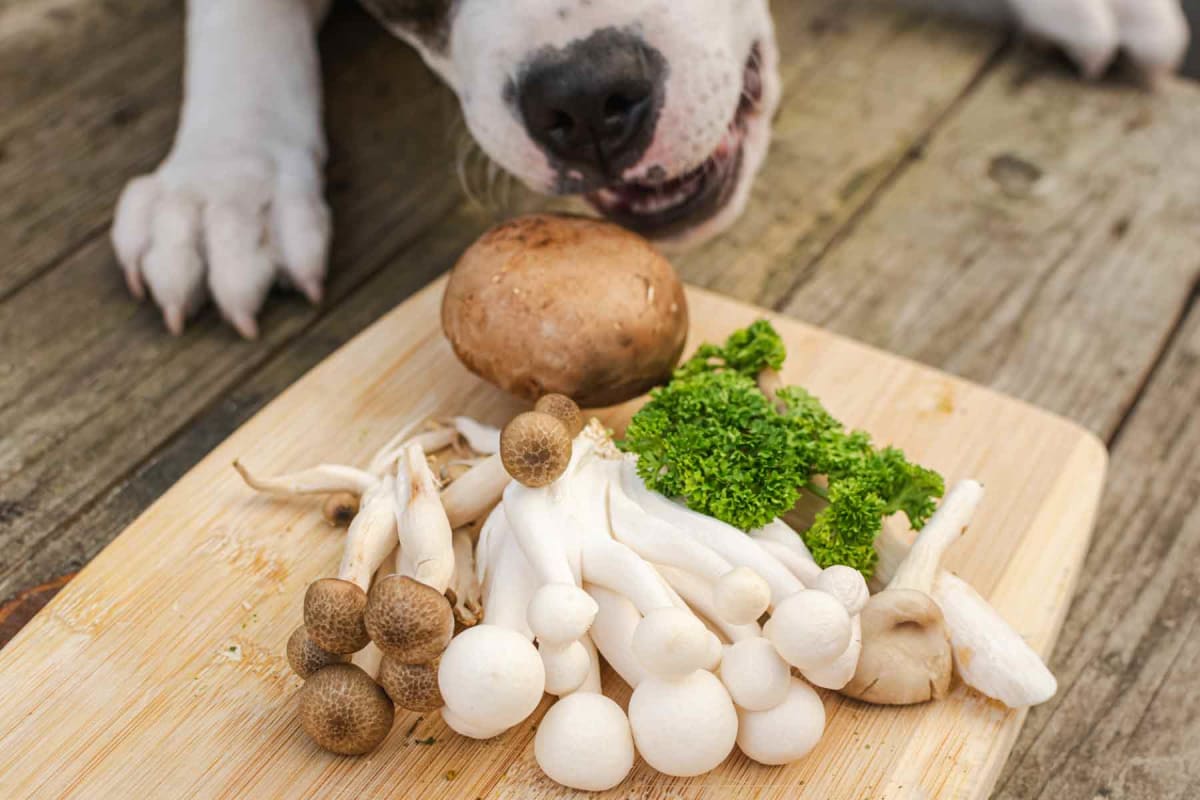
Can dogs eat mushrooms?
Can dogs eat mushrooms?
Can dogs have mushrooms?
When it comes to mushrooms and dogs, the answer isn't a simple yes or no. Store-bought mushrooms that are safe for human consumption—like button, portobello, and shiitake—are generally not toxic to dogs in small amounts. However, wild mushrooms can be extremely dangerous and potentially fatal if ingested by your canine companion.
When it comes to feeding your dog, it's always best to err on the side of caution. Let's explore mushrooms and dogs in more detail to ensure your furry friend stays happy and healthy.
Are mushrooms bad for dogs?
While certain store-bought mushrooms aren't inherently toxic to dogs, they don't offer significant nutritional benefits either. Dogs have different dietary needs than humans, and their primary nutrition should come from quality dog food formulated for their specific needs.
Some dogs may also experience digestive upset when introduced to new foods like mushrooms. This can include symptoms such as gas, diarrhea, or vomiting—especially if the mushrooms were prepared with ingredients like garlic, onions, or excessive salt and oil, which are harmful to dogs.
Can dogs eat cooked mushrooms?
Plain, store-bought mushrooms that have been properly cooked without seasoning are generally not toxic to dogs in small amounts. However, mushrooms prepared for human consumption often contain ingredients that are harmful to dogs.
Garlic, onions, salt, butter, and various spices can all cause serious problems for your canine companion. Even without these additives, some dogs may still have difficulty digesting mushrooms, leading to stomach upset.
What mushrooms are poisonous to dogs?
Wild mushrooms pose the greatest threat to your dog's health. According to veterinary experts, there are thousands of mushroom species, and many are toxic. Some of the most dangerous types include:
Amanita phalloides (Death Cap)
Amanita gemmata (Jeweled Death Cap)
Amanita muscaria (Fly Agaric)
Galerina marginata (Deadly Galerina)
Gyromitra species (False Morels)
The challenge is that many poisonous mushrooms can look similar to non-toxic varieties. Even experienced mushroom foragers can sometimes misidentify them, which is why you should never let your dog eat wild mushrooms under any circumstances.
Symptoms of mushroom poisoning in dogs
If your dog has consumed a toxic mushroom, symptoms can appear within 15 minutes or take up to 12 hours to develop. Some common signs include:
Vomiting and diarrhea
Excessive drooling
Lethargy or weakness
Yellowing of the skin, gums, or eyes (jaundice)
Uncoordinated movement, tremors, or seizures
Excessive urination or decreased urination
Abdominal pain
Coma
Different mushroom species affect dogs in different ways. Some primarily cause digestive issues, while others can lead to liver failure, kidney damage, or neurological problems. Contact your veterinarian right away if you notice any unusual symptoms.
Treating mushroom poisoning in dogs
Treatment for mushroom poisoning depends on the type of mushroom consumed and how quickly your dog receives medical attention. Your veterinarian may take several approaches:
They may induce vomiting if the ingestion was recent—typically within the last 1 to 2 hours. This helps remove any remaining mushroom pieces from your dog's stomach.
Activated charcoal may be administered to help absorb toxins in the digestive tract before they enter the bloodstream. Your dog might need multiple doses over several hours.
Supportive care is essential and may include IV fluids to prevent dehydration and maintain kidney function. Medications to protect the liver, control seizures, or address specific symptoms might also be necessary.
In severe cases, blood tests will monitor liver and kidney function. Some dogs may need hospitalization for several days, especially if liver or kidney damage has occurred.
The prognosis depends on the mushroom type, amount eaten, and how quickly treatment began. With prompt veterinary care, many dogs can recover fully from mushroom poisoning.
What to do if your dog ate mushrooms
If you know or suspect your dog has eaten wild mushrooms, treat it as an emergency:
Contact your veterinarian or an emergency animal hospital immediately.
If possible, take a photo or sample of the mushroom (using gloves).
Note when your dog might have eaten it and any symptoms they're showing.
Don't induce vomiting unless directed to do so by a veterinary professional.
Time is critical in cases of mushroom poisoning. The sooner your dog receives treatment, the better their chances of recovery. If your regular vet is unavailable, contact your nearest emergency vet or call the ASPCA Animal Poison Control Center at (888) 426-4435.
How to prevent mushroom poisoning in dogs
Prevention is the best approach when it comes to mushrooms and your dog:
Regularly check your yard and remove any mushrooms you find.
Keep your dog on a leash during walks to prevent them from eating unknown substances.
Consider using pet-safe fungicides in areas where mushrooms frequently grow.
Train your dog to "leave it" or "drop it" on command.
Remember that mushrooms often appear after rainy weather, so be extra vigilant during these times.
Safe treat alternatives for dogs
If you're looking for healthy treats to share with your dog, there are many safer foods dogs can eat, including.
Carrots (raw or cooked without seasoning)
Blueberries and banana slices
Small pieces of skinless, boneless, lean cooked meat without seasoning
Plain, cooked sweet potato
Always introduce new foods gradually and in small amounts to monitor for any adverse reactions.